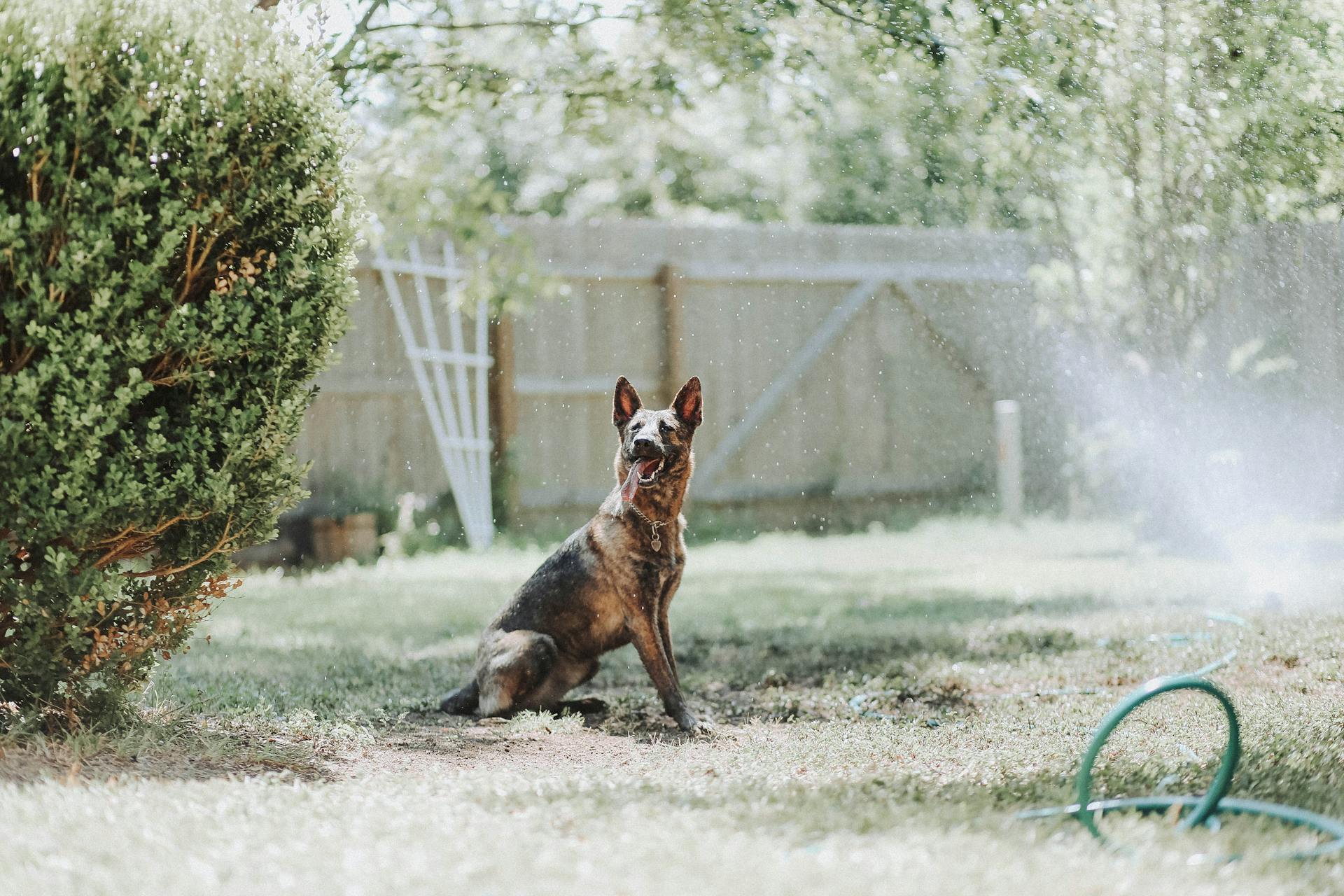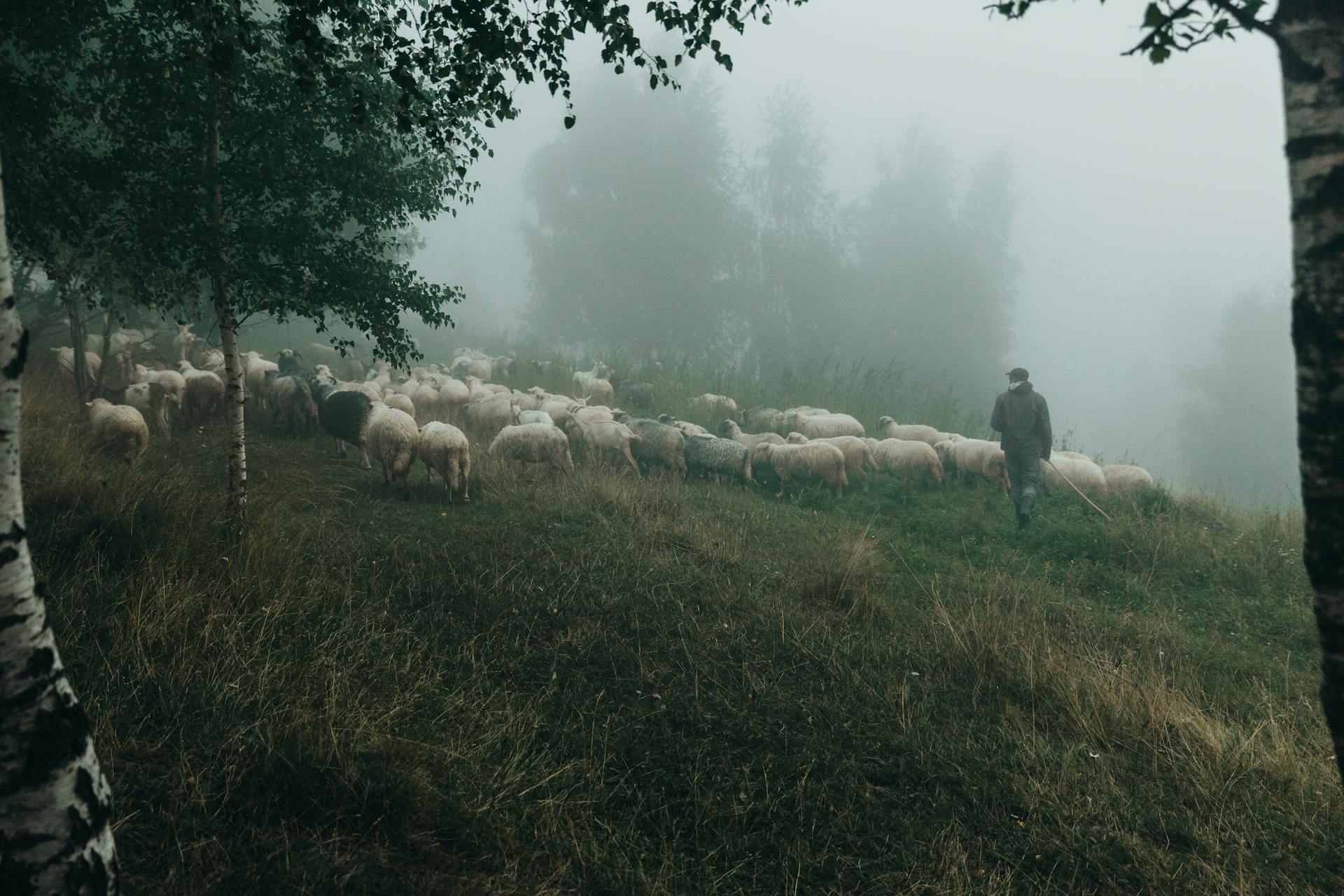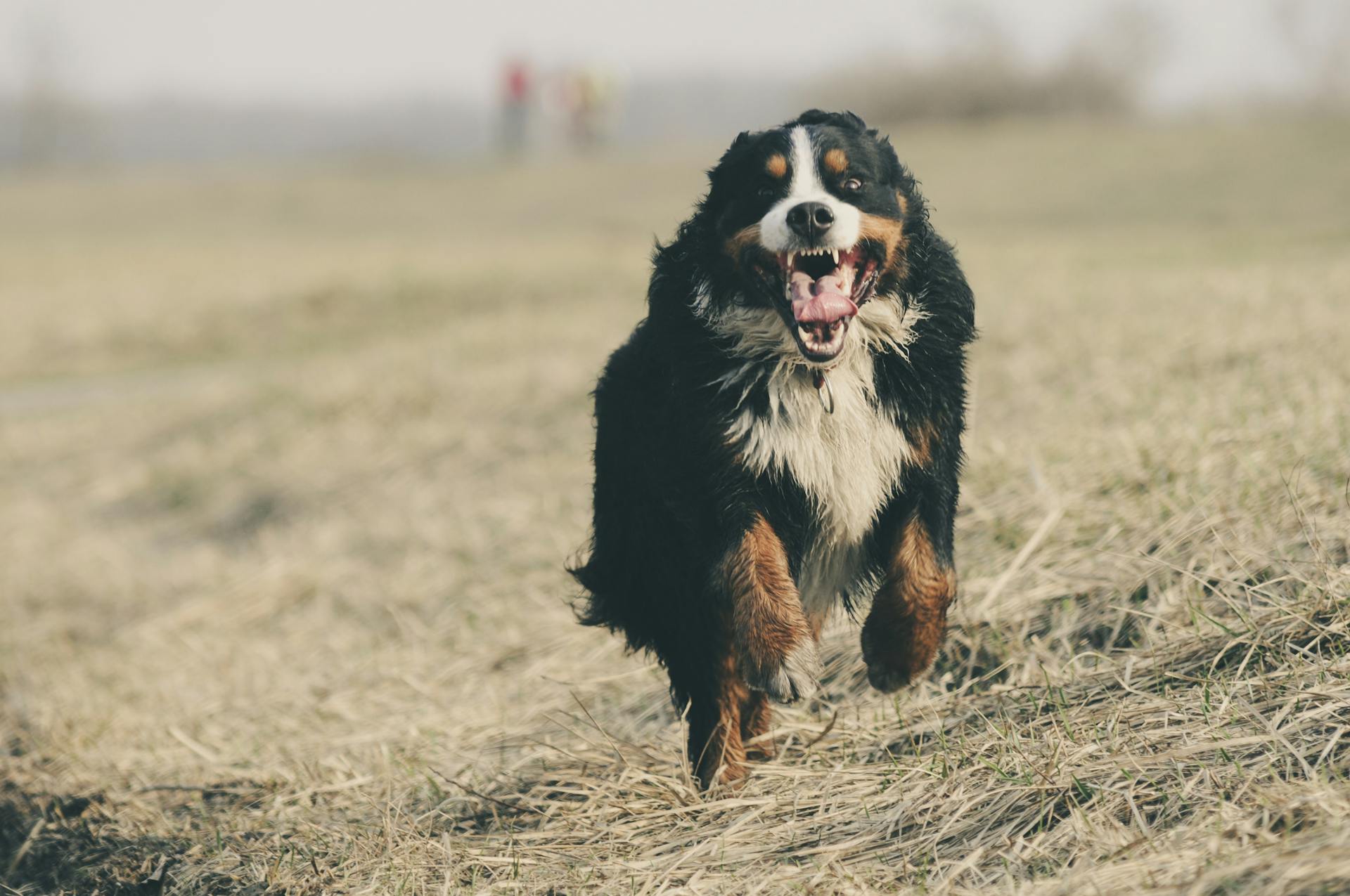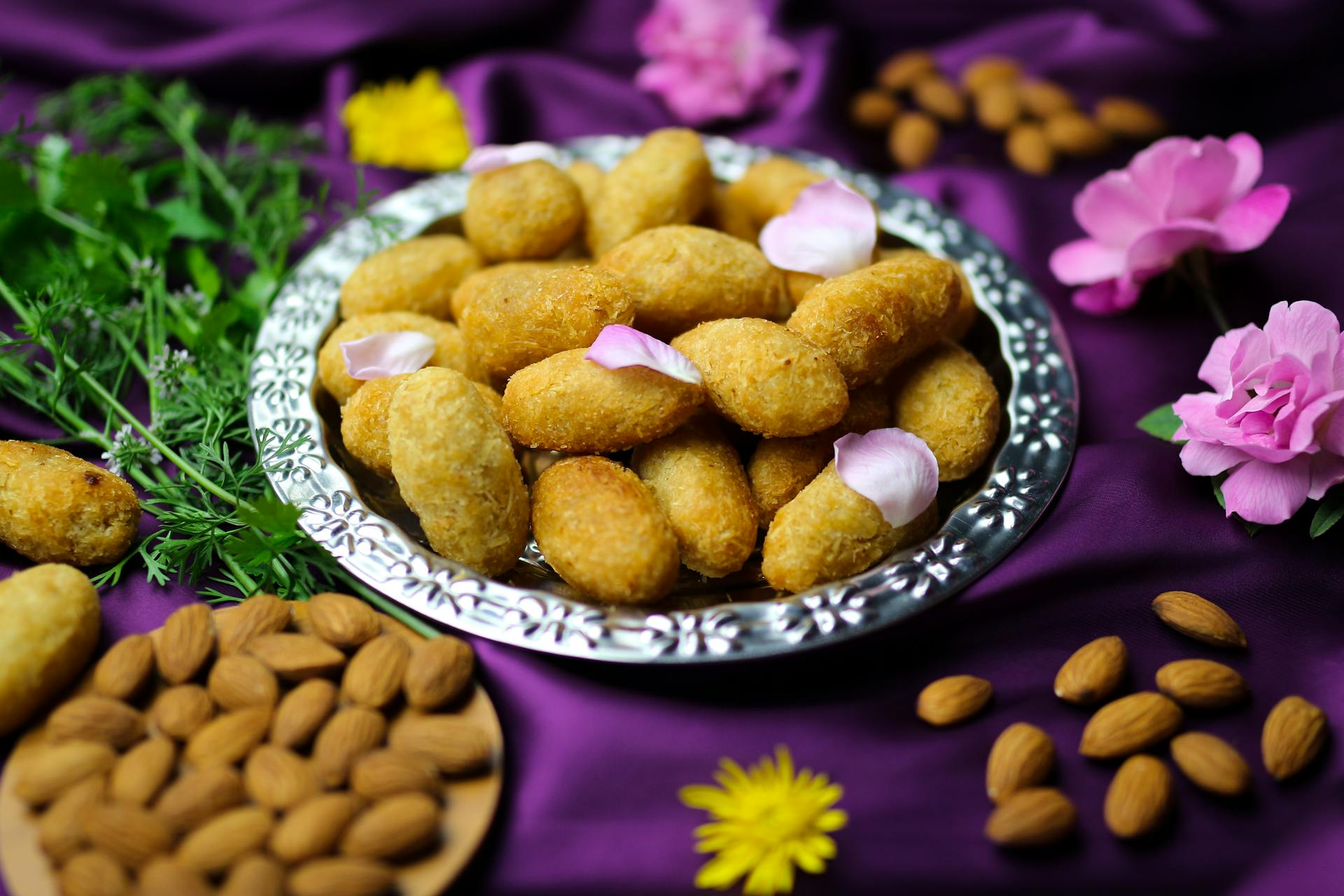The Bouvier Des Flandres is a large and powerful breed, weighing between 70-120 pounds and standing between 23-27 inches tall. They have a distinctive beard and mustache, which requires regular grooming.
Bouvier Des Flandres puppies are born with their eyes closed, but they start to open them around 10-14 days old. Their ears also start to open around the same time.
Bouvier Des Flandres are known for their intelligence and trainability, but they can be stubborn at times. They require consistent training and socialization from an early age.
A different take: Breeds of Dogs That Start with H
Breed Information
The Bouvier des Flandres is a loyal and loving breed that makes a great family pet. They are originally from Belgium and Northern France, where they were bred to be herding and working dogs.
They are naturally protective of their family and can be a bit bossy if not well socialized early. However, with proper training and attention, they can thrive in a family environment.
Here are some key characteristics to consider when bringing a Bouvier des Flandres puppy home:
- They need regular exercise and grooming
- They are sensitive by nature and can be slow to mature
- They have a strong herding instinct and may chase cars and small animals
- They require frequent attention from their family
- They can be gassy and drool a lot
Overall, the Bouvier des Flandres is a unique and loving breed that can make a wonderful addition to the right family.
Breed History
The Bouvier des Flandres breed has a rich history that dates back to the 17th century in Southwest Flanders and the northern French plain. Farmers and cattlemen needed a dog that could work on various areas of the farms, and the Bouvier was born.
Originally, the Bouvier was bred to herd cattle, guard the herd, and even pull carts, churn butter, and work the grist mill. This created a great variation in appearance, but they exhibited enough characteristics in common to be considered the same breed.
The Bouvier was known by many names, including "koehond", or cow dog, "vuilbaard", or dirty beard, and "toucheur de boeuf", or cattle driver. The term "Bouvier" is a French word meaning oxherd or cowherd.
Take a look at this: Border Collies Herd
The breed was first recognized by the AKC in 1931, and the first standard for the Bouvier was developed in 1912 by the vice president of the Club St. Hubert du Nord in Europe. The Bouvier was used as a service dog during both World Wars, and was also used as a messenger, a sentry, and a search dog.
The Bouvier's working heritage is highly prized, and in Belgium, a Bouvier cannot win the title of conformation champion unless he has also proven himself as a working dog.
Intriguing read: Are German Shepherds Good for First Time Owners
A Unique Breed
The Bouvier Des Flandres is a unique breed that's full of personality. They're known for their gentle disposition and even temper, making them a great addition to families with children.
Their bold and fearless nature also makes them excellent guard dogs, but they can be sensitive and slow to mature. This means they need regular exercise and grooming to keep them happy and healthy.
Bouviers have a strong herding instinct, which can lead them to chase cars and small animals if they're not properly socialized. They need frequent attention from their family to keep them from becoming bossy and overprotective.
One thing to keep in mind is that Bouviers can be gassy and drool a lot, so they may not be the best choice for everyone. However, for those who are willing to put in the work, they can make loyal and loving companions.
Here are some key characteristics of the Bouvier Des Flandres breed:
- Even temper and gentle disposition
- Bold, steady, and fearless
- Excellent guard dog, courageous and dependable
- Good with children
- Agile, sturdy, and muscular
- Excellent family dog that loves human companionship
They thrive in active families who can provide them with regular exercise and attention. With proper training and socialization, they can learn to be well-behaved and loyal companions.
Health and Care
Bouvier des Flandres puppies are generally a hardy breed with a life expectancy of 10-12 years. They are prone to a few inherited diseases that pet parents should be aware of.
Hip and elbow dysplasia are common conditions in Bouviers, causing lameness and pain. These conditions can be managed through weight management, anti-inflammatories, and joint supplements, but sometimes surgery is required.
Regular exercise and a balanced diet are essential for maintaining your Bouvier's joint health. You should also keep an eye out for signs of hip and elbow dysplasia, such as limping or difficulty getting up from a lying position.
Here are some common health issues that can affect Bouvier des Flandres:
It's essential to work closely with your veterinarian to monitor your Bouvier's health and catch any potential issues early on. Regular check-ups and a balanced lifestyle will help your furry friend live a happy and healthy life.
Care and Lifestyle
Your Bouvier des Flandres is a beloved member of your family, and taking good care of them is essential to their health and happiness. Bouvier des Flandres have a life expectancy of 10-12 years, and they are a fairly hardy breed.

A proper diet is crucial for your Bouvier's health. Feed a high-quality diet appropriate for their age, and keep their diet consistent. Don't give them people food, as it can cause digestive problems.
Regular exercise is also vital for your Bouvier's physical and mental well-being. They aren't highly active, but they do need regular exercise. Start with normal play on grass or puppy agility play, and avoid hard surfaces like pavement until they're full grown.
Bouvier des Flandres have a shaggy coat that requires weekly brushing and trimming at least 3 times a year. Brushing their teeth daily will prevent periodontal disease, and clean their ears weekly to prevent infections.
To keep your Bouvier safe and out of trouble, supervise them like you would a toddler, and block off rooms as necessary. Crate training is an important aid in housetraining, but don't leave them in the crate for more than a few hours at a time.
Here are some essential care tasks to keep in mind:
- Brush their coat weekly
- Trim their coat at least 3 times a year
- Brush their teeth daily
- Clean their ears weekly
- Supervise them like a toddler
- Crate train them for housetraining
By following these care tips and regular veterinary check-ups, you can help your Bouvier des Flandres live a long, happy, and healthy life.
Spay or Neuter
Spaying or neutering your Bouvier is a crucial step in their health and care. It decreases the likelihood of certain types of cancers.
Spaying or neutering eliminates the possibility of your pet becoming pregnant or fathering unwanted puppies. This is a huge relief for many pet owners.
Performing this surgery also gives your veterinarian a chance to identify and address some of the diseases your dog is likely to develop. For example, hip X-rays or a puppy tooth extraction can be done at the same time.
Routine blood testing prior to surgery helps identify and take precautions for common problems that increase anesthetic or surgical risk. This ensures a safe and smooth procedure for your pet.
Environment
A Bouvier des Flandres needs plenty of outdoor space to run. They thrive in rural or country settings with large yards where they can speed around.
A home with a large yard is ideal, but a small home or apartment can work if you can provide ample exercise every day. Bouviers can adjust to small living spaces, but it's not their preference.
A different take: German Shorthaired Pointer Free to Good Home

Bouviers are good with kids, especially if they grow up together. They view children as part of their "pack" and are more likely to get along.
However, keep an eye on a Bouvier around kids, especially small children. Their large stature and herding instinct may cause them to nip at a child's heels or accidentally knock them over.
It's essential to teach kids how to interact with dogs, as Bouviers can be strong-willed. They may not be a good fit for households with additional pets, especially if they're not socialized properly.
Bouviers can be protective and aloof around strangers or company, so it's crucial to socialize them well. A strong-willed Bouvier requires an experienced dog parent who can stay ahead of them.
Temperament and Training
Bouviers are known for being intelligent, protective, and strong-willed. They need an owner who can kindly and consistently show leadership, otherwise, they're likely to fill the void.
A Bouvier's strong personality requires early socialization, exposure to many different people, sights, sounds, and experiences, to grow up to be a well-rounded dog. They can be rowdy or destructive when young, but typically mellow out as they age.
To train a Bouvier, a mixture of firm corrections and positive reinforcement is ideal. They're extremely intelligent and can pick up commands in moments, but their strong personality can make them difficult to train. Leash training is also crucial to prevent them from running amok in the neighborhood.
Here are some key traits to keep in mind when training your Bouvier:
- Intelligent and trainable with consistency and positive reinforcement
- Strong-willed and may require a firm hand during training
- Requires early socialization to prevent overprotectiveness and dominance
- Leash training is essential to prevent running amok in the neighborhood
Temperament and Training
The Bouvier des Flandres is a spirited and bold breed that is intelligent and even tempered. They are known for their protective nature, making them wonderful guard dogs.
Bouviers are independent dogs who need lots of attention from their families. They can be devoted to their families, but may also be reserved or aloof with strangers.
Early socialization is crucial for Bouviers, as it helps prevent them from becoming dominant and overprotective. This can also help lower aggression toward strangers and foreign dogs.
Bouviers are strong-willed dogs that need an owner who can kindly and consistently show leadership. Consistent training and socialization can help ensure that your Bouvier grows up to be a well-rounded dog.
Recommended read: What Do Puppys Need
Here are some key traits to keep in mind when training your Bouvier:
- Highly intelligent and responsive to training
- Can be strong-willed and independent
- Need consistent training and socialization from an early age
- May be prone to boredom and destructive behavior if not provided with enough mental and physical stimulation
Bouviers are happiest when they're working or engaged in some capacity, whether that's herding, guarding, or simply spending time with their family. Providing them with a job or activity can help keep them happy and fulfilled.
Remember, every dog is unique, but with patience, consistency, and positive reinforcement, you can help your Bouvier become a well-behaved and loving companion.
Exercise Needs
Bouviers des Flandres need 60-90 minutes of physical activity daily to stay happy and healthy.
Their high energy levels can lead to weight gain if they don't get enough exercise, so regular physical activity is a must.
As working dogs, Bouviers have lots of stamina and will happily walk farther than you, so be prepared for a workout.
A basic walk just won't suffice for their daily exercise needs, so consider going for a run or a hike instead.
Discover more: How Much Exercise Do Border Collies Need
You can also incorporate games and activities into your dog's daily routine to stimulate them physically and mentally.
Tug of war, Frisbee, and agility courses are all great options to put your Bouvier's intelligence to work.
Some Bouvier parents even participate in herding trials or dog shows, which can be a fun way to exercise your dog and challenge them mentally.
Swimming is another great way to burn off energy, especially if you have access to a lake or other body of water.
As your dog ages, you can decrease the amount of daily exercise based on their needs, but gentle exercise is still important to keep them in good physical shape.
Bouviers love water, so don't be surprised if they try to join you in the shower or pool.
If you have a Bouvier puppy, be mindful of their daily activity level and avoid overworking them while they're young.
Similarly Sized Breeds
If you're looking for breeds that are similar in size to the Bouvier des Flandres, you'll want to consider the Boxer Shepherd, which is 99% similar in size. This means they'll likely require similar living arrangements and exercise needs.
Intriguing read: Breeds Similar to Rhodesian Ridgeback
The Boxer Shepherd is a high-energy breed that needs plenty of physical and mental stimulation. They're not suited for apartment living and need a large yard to run around in.
If you're willing to put in the work, the Boxer Shepherd can make a loyal and loving companion. They're naturally protective of their family, but also need early socialization to prevent aggression.
Here are some other breeds that are similar in size to the Bouvier des Flandres:
The Bull Arab, for example, is a high-energy breed that's bred for hunting and requires plenty of exercise and mental stimulation. They're not suited for apartment living and need a large yard to roam around in.
Grooming and Feeding
Taking care of your Bouvier des Flandres puppy's grooming and feeding needs is crucial for their overall health and happiness.
To start, your Bouvier puppy will need to be fed a high-quality, low-calorie diet that keeps them from growing too fast. This means a diet with 22 to 24 percent protein and 12 to 15 percent fat. You'll also need to measure their food and feed them twice a day to keep them in good shape.
A fresh viewpoint: Do Border Collies Need to Be Groomed
Bouviers are prone to obesity, so be sure to limit treats and stick to their regular meals. For a puppy, three to five cups of food per day is a good starting point, but be sure to consult with your veterinarian to determine the best amount for your puppy's specific needs.
Grooming is also an essential part of Bouvier care. Their thick coat needs to be brushed several times a week, and they should be bathed every six to eight weeks. You'll also need to trim their coat every few months and check their ears weekly for redness or a bad odor.
Here are some key grooming tasks to remember:
- Brush your Bouvier's coat at least once a week, and more often if they get dirty or develop tangles.
- Bathe your Bouvier every six to eight weeks.
- Trim their coat every few months.
- Check their ears weekly for redness or a bad odor.
- Brush their teeth daily to prevent plaque buildup and infection.
Size
When considering the size of your Bouvier des Flandres, keep in mind that males stand about 26 inches tall.
This breed's height can vary slightly between males and females, with females standing about 25 inches tall.
Males weigh between 70 to 100 pounds, a range that's worth considering when deciding on food portions and exercise needs.
For another approach, see: When Do Border Collies Stop Growing
Grooming
Grooming is a crucial part of owning a Bouvier des Flandres. Their double coat requires regular maintenance to prevent matting and tangling.
The Bouvier's thick coat needs to be brushed several times a week, and it's a great idea to check the coat for burrs, ticks, or weeds every day. Brushing your Bouvier's teeth at least two or three times a week is also important to remove tartar buildup and bacteria.
Bathing your Bouvier every six to eight weeks is a good rule of thumb, but this may need to be adjusted based on how much time your dog spends outside. If your Bouvier gets dirty quickly, you may need to bathe them more frequently.
Trimming your Bouvier's nails once or twice a month is necessary to prevent painful tears and other problems. If you're not experienced trimming dog nails, ask a vet or groomer for pointers.
Here's a quick rundown of the Bouvier's grooming needs:
- Brushing: at least once a week, but likely more often
- Bathing: every 6-8 weeks, or as needed
- Nail trimming: once or twice a month
- Ear cleaning: weekly to prevent infections
- Dental care: daily teeth brushing to prevent plaque buildup
Checking your Bouvier's ears weekly for redness or a bad odor can help prevent infections. If you notice anything unusual, speak to your vet.
Feeding
Feeding your Bouvier des Flandres is crucial for their overall health and well-being. A balanced diet consisting of high-quality commercial dog food tailored to their age and stage in life is essential.
You'll need to feed your Bouvier between three to five cups of food per day, divided into two meals. This can vary depending on their size, age, build, metabolism, and activity level.
A high-quality, low-calorie diet is recommended for Bouvier puppies, with 22 to 24 percent protein and 12 to 15 percent fat. This will help prevent bone disorders that can occur in rapidly-growing puppies.
To ensure your Bouvier is getting the right amount of food, measure their intake and feed them twice a day. Avoid leaving food out all the time, as this can lead to overeating and obesity.
Bouviers are prone to obesity, so be sure to limit treats and only give them as rewards for good behavior. A healthy Bouvier should have a visible waist and their ribs should be easily felt but not seen.
Recommended read: Puppys Food
Owner Experiences
As a bouvier des flandres owner, you'll quickly realize that these dogs are built for action. They need at least 2 hours of exercise per day, preferably in the form of long walks, runs, or hikes.
One of the most rewarding aspects of owning a bouvier des flandres puppy is their loyalty and protective nature. They are devoted to their family and will bark to alert their owners to any potential threats.
Bouvier des flandres puppies are relatively easy to train, thanks to their intelligence and eagerness to please their owners. With patience and consistency, you can teach them to be well-behaved and obedient.
If you're considering bringing a bouvier des flandres puppy into your home, be prepared for regular grooming sessions. Their thick, shaggy coat requires brushing at least once a week to remove loose hair and prevent mats.
Here are some key characteristics to keep in mind when caring for your bouvier des flandres puppy:
Frequently Asked Questions
How much does a Bouvier des Flandres cost?
A Bouvier des Flandres typically costs between $1,200 and $2,500 from a reputable breeder. If you're considering bringing one home, here's what you need to know.
Is a Bouvier a good family dog?
Yes, the Bouvier des Flandres is a great family pet due to its calm and docile nature. However, proper socialization is key to ensuring a harmonious household with other animals and dogs.
What is the average lifespan of a Bouvier?
The average lifespan of a Bouvier des Flandres is 11 years. With proper care, they can live a happy and healthy life for about a decade.
Featured Images: pexels.com

